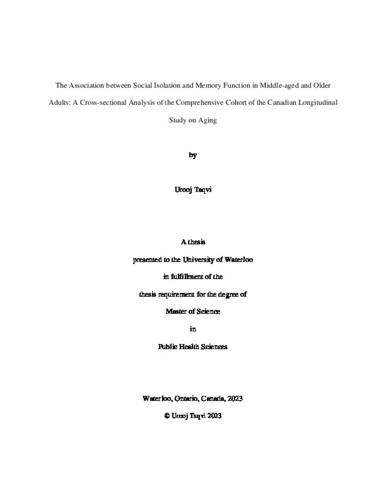UWSpace will be migrating to a new version of its software from July 29th to August 1st. UWSpace will be offline for all UW community members during this time.
The Association between Social Isolation and Memory Function in Middle-aged and Older Adults: A Cross-sectional Analysis of the Comprehensive Cohort of the Canadian Longitudinal Study on Aging
| dc.contributor.author | Taqvi, Urooj | |
| dc.date.accessioned | 2023-01-20 19:15:47 (GMT) | |
| dc.date.available | 2023-01-20 19:15:47 (GMT) | |
| dc.date.issued | 2023-01-20 | |
| dc.date.submitted | 2023-01-18 | |
| dc.identifier.uri | http://hdl.handle.net/10012/19093 | |
| dc.description.abstract | Background: Social isolation is a psychosocial risk factor thought to be inversely associated with memory function, although only a small number of published studies exist in the field. These studies report mixed results due to variations in methods (e.g., study design, measures of social isolation that do not capture the full extent of the construct) or the inclusion of highly select samples of target populations. Given limitations of the published literature, this thesis investigated the cross-sectional association between social isolation and memory in a large, community-dwelling sample of Canadian adults aged between 45 and 85 years. The association was examined across the entire sample and in separate stratified analyses defined by age group and sex. Methods: Baseline data from the Comprehensive Cohort of the Canadian Longitudinal Study on Aging (CLSA) were used to regress memory scores onto a composite Social Isolation Index (SII) that measured numbers of social contacts, frequencies of interaction with these contacts, frequencies of participation in social activities, marital status, and retirement status. The SII ranged from 0–5 and scores between 2-5 were classified as “socially isolated”, while scores between 0-1 were classified as “not socially isolated”. The dichotomous version of the SII was used in all analyses. Memory was measured using the immediate and delayed recall administrations of the Rey Auditory Verbal Learning Test (RAVLT); raw test scores were converted into z-scores (𝜇 = 0, 𝜎 = 1) and analyzed separately for each administration. Multivariable linear regression models controlled for a range of covariates, including age group, sex, education, income, presence of chronic conditions (≥ 1 versus 0), functional impairment, presence of depressive symptoms, smoking status, alcohol use, and functional social support (low versus high). Weight and strata variables were included in the models to account for the CLSA’s complex survey design. Full models adjusted for all covariates (except for those used for stratification purposes) were separately stratified by age group and sex to assess effect modification. Results: Regression models showed small, inverse associations between social isolation and RAVLT I (β = -0.0019; 95% CI: -0.0469 to 0.043) and RAVLT II (β = -0.0010; 95% CI: -0.0496 to 0.0475) z-scores. However, the associations were weak and not statistically significant. Stratification by age group and sex did not show the presence of effect modification. Conclusion: The results did not provide evidence for a cross-sectional association between social isolation and memory in the CLSA sample. These results may indicate the absence of an association in the population of middle-aged and older Canadian adults. The CLSA intentionally excluded cognitively impaired individuals from the study (recruitment bias) and individuals who were not socially isolated appeared to be more likely to participate in the study (volunteer bias). Taken together, these biases may have contributed to the weak and statistically non-significant associations. Longitudinal analyses may be needed to investigate the association between social isolation and memory in the CLSA, as more variability in the sample’s degree of social isolation and memory can be expected as the participants age over time. | en |
| dc.language.iso | en | en |
| dc.publisher | University of Waterloo | en |
| dc.title | The Association between Social Isolation and Memory Function in Middle-aged and Older Adults: A Cross-sectional Analysis of the Comprehensive Cohort of the Canadian Longitudinal Study on Aging | en |
| dc.type | Master Thesis | en |
| dc.pending | false | |
| uws-etd.degree.department | School of Public Health Sciences | en |
| uws-etd.degree.discipline | Public Health and Health Systems | en |
| uws-etd.degree.grantor | University of Waterloo | en |
| uws-etd.degree | Master of Science | en |
| uws-etd.embargo.terms | 0 | en |
| uws.contributor.advisor | Oremus, Mark | |
| uws.contributor.affiliation1 | Faculty of Health | en |
| uws.published.city | Waterloo | en |
| uws.published.country | Canada | en |
| uws.published.province | Ontario | en |
| uws.typeOfResource | Text | en |
| uws.peerReviewStatus | Unreviewed | en |
| uws.scholarLevel | Graduate | en |

